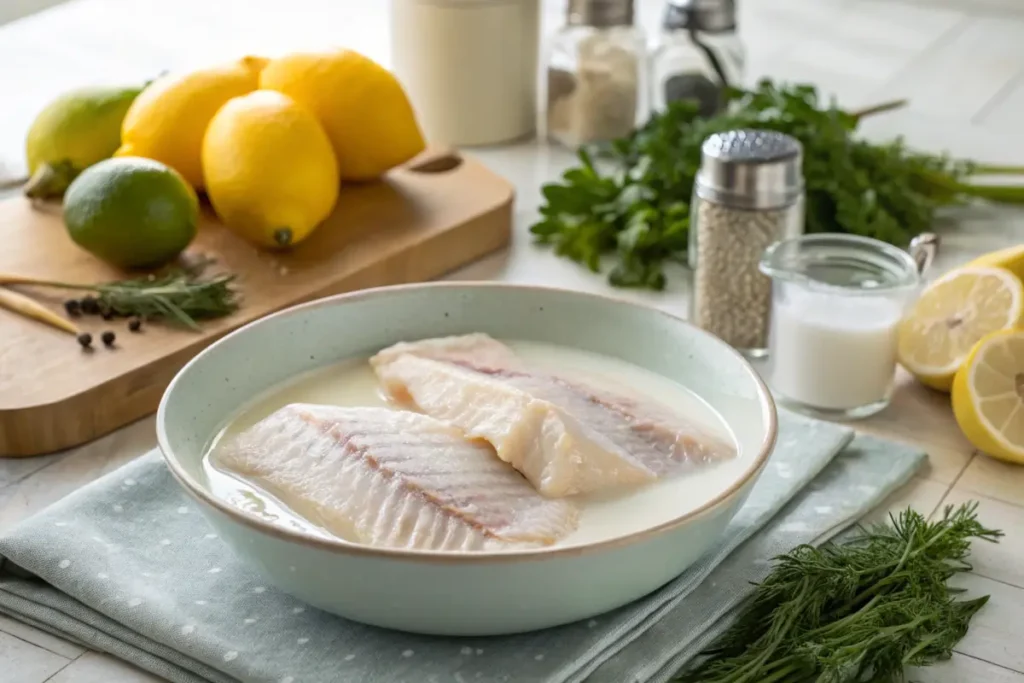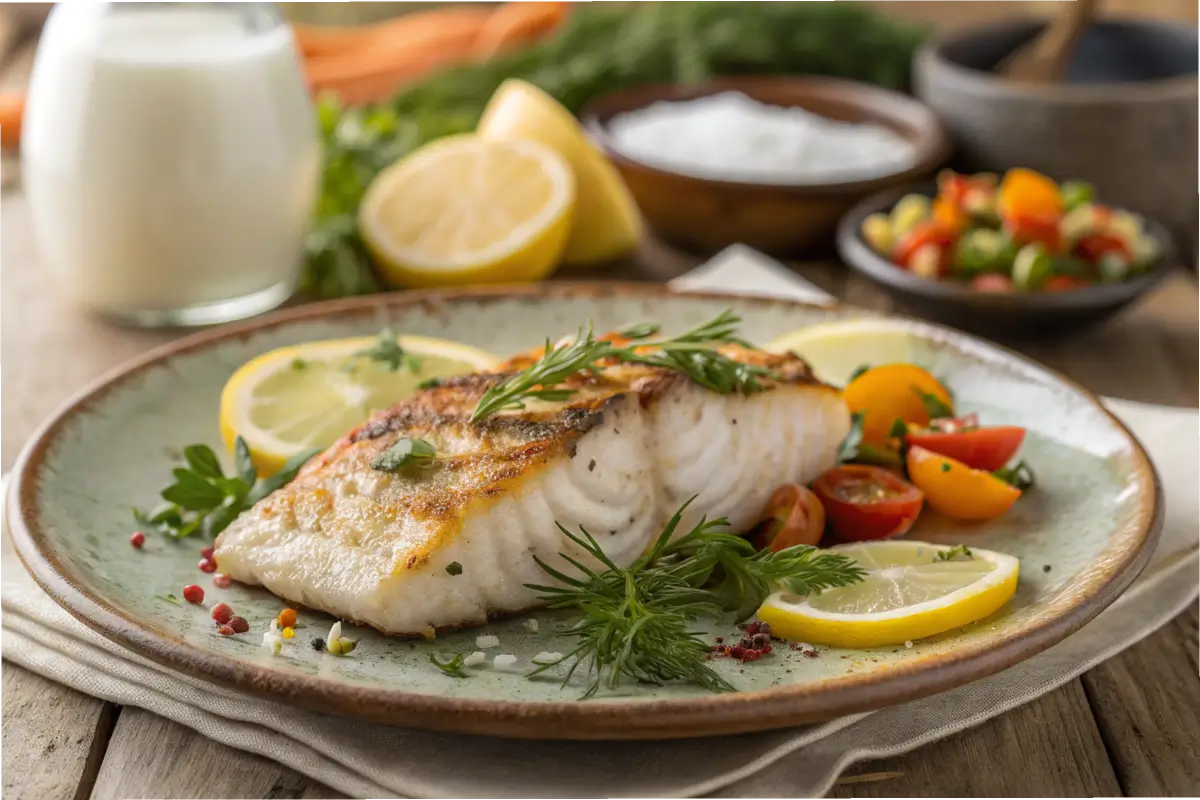Cooking fish can sometimes feel like a delicate art. Among the countless questions home cooks face, one stands out when it comes to preparing rockfish: Should I soak rockfish before cooking? This article dives deep into this topic, unraveling whether soaking is necessary, the best techniques to do so, and alternative methods to prepare rockfish for a meal that’s both flavorful and satisfying. Whether you’re a seafood enthusiast or a curious beginner, you’ll learn how to bring out the best in this versatile fish.
Introduction to Soaking Rockfish
Why People Ask About Soaking Rockfish
Cooking seafood often sparks questions about preparation methods, and soaking fish before cooking is one of the most common. With rockfish’s delicate flavor and firm texture, cooks frequently wonder if soaking can enhance its taste or fix common issues like a “fishy” odor. Soaking isn’t always a one-size-fits-all solution, but it’s a time-tested practice for certain scenarios.
Overview of Rockfish as a Culinary Choice
Rockfish is prized for its mild flavor and adaptability to different recipes. Whether it’s baked, fried, grilled, or steamed, this fish provides a blank canvas for a variety of spices, herbs, and marinades. It’s a favorite among seafood lovers because its firm flesh holds up well to different cooking techniques, making it an excellent choice for both simple and intricate dishes.
Purpose of This Article: Clearing Up Myths and Facts
In this article, we’ll address whether you should soak rockfish before cooking, what benefits soaking might bring, and when it’s not necessary. We’ll also explore soaking methods, alternatives like marinating, and how to choose the best preparation technique for your cooking goals. By the end, you’ll feel confident deciding if soaking rockfish is worth the effort.
Let me know when you’re ready for Part 2!
Understanding Rockfish
What is Rockfish? An Overview
Rockfish isn’t just one species but a term that encompasses a variety of fish often found in the Pacific and Atlantic oceans. Known for its firm, white flesh and mild flavor, rockfish is a versatile choice for chefs and home cooks alike. Its ability to absorb marinades and seasonings makes it perfect for dishes ranging from delicate steamed fillets to boldly spiced fried preparations.
Whether you’ve bought rockfish fresh or frozen, you might wonder, Should I soak rockfish before cooking? While soaking isn’t always required, it’s a technique that can enhance the texture and neutralize any unwanted odors, especially if the fish isn’t freshly caught.
For more rockfish recipes, check out Rockfish Recipes.
Nutritional Benefits of Rockfish
Rich in lean protein and omega-3 fatty acids, rockfish is a nutritious option for health-conscious eaters. It also provides essential vitamins like D and minerals such as potassium and selenium. These nutrients support heart health, brain function, and overall well-being.
Because it’s naturally low in fat, rockfish pairs well with healthy cooking methods like baking or steaming. For those looking to amplify its benefits, soaking or marinating the fish can ensure it retains moisture during cooking, making it even more delectable.
Flavor Profile and Cooking Versatility of Rockfish
Mild and slightly sweet, rockfish is a culinary chameleon. Its adaptable flavor pairs well with bold spices, subtle herbs, and everything in between. When considering Should I soak rockfish before cooking?, it’s important to think about your chosen preparation. For example, brining can enhance the fish’s natural sweetness, while milk soaking helps neutralize stronger odors.
For tips on how to best prepare rockfish, you can explore What is the Best Way to Use Rockfish.
The Purpose of Soaking Fish Before Cooking
Why Soak Fish? Traditional Practices Explained
Soaking fish is an age-old culinary practice that serves multiple purposes. For rockfish, it can:
- Neutralize unpleasant odors caused by prolonged storage.
- Enhance the texture by firming up the flesh.
- Remove impurities, like blood or excess salt, from pre-packaged fish.
However, not all fish require soaking. For example, fresh rockfish that smells mild and appears translucent might not benefit from the process. If you’re unsure, consider soaking if the fish has a noticeable “fishy” aroma or if your recipe demands it.
When Soaking Rockfish is Recommended
Soaking rockfish before cooking is especially useful if:
- The fish is frozen or slightly past peak freshness.
- You want to improve its texture for grilling or frying.
- A recipe calls for brining or milk soaking to enhance flavor.
That said, if you’ve opted for fresh rockfish, soaking might be unnecessary. Instead, a simple rinse or marinade could suffice.
Alternatives to Soaking: Marinating and Seasoning
If soaking seems like a hassle, consider marinating. Marinades offer flavor and tenderizing benefits, often with less prep time. Rockfish responds beautifully to marinades that include acidic components like lemon juice, yogurt, or vinegar.
For example:
- Simple Herb Marinade: Olive oil, garlic, parsley, and lemon juice.
- Asian-Inspired Marinade: Soy sauce, sesame oil, and ginger.
Seasoning is another straightforward alternative. Spices like paprika and herbs such as dill can elevate the fish’s natural flavor without requiring additional steps.
For more ideas on flavoring seafood, check out the resource Is Rockfish a Good Eating Fish.
Let me know when you’re ready for Part 4!
Popular Soaking Techniques for Rockfish
Saltwater Brine: The Classic Choice
Saltwater brining is one of the simplest and most effective ways to soak rockfish. It enhances the texture, slightly firms the fish, and provides a mild seasoning that complements its natural flavor. To prepare a basic brine:
- Combine 4 cups of cold water with 2-3 tablespoons of salt.
- Submerge the fish completely, ensuring it’s fully covered.
- Let it soak for 30 minutes to 1 hour.
After brining, rinse the fish under cold water and pat it dry. This step is essential to avoid overly salty results. For those wondering, Should I soak rockfish before cooking?, saltwater brine is an excellent starting point.
Milk Soaking: Neutralizing Odors
Milk soaking is a tried-and-true method for removing strong, “fishy” odors from seafood. Proteins in milk bind to odor-causing compounds, leaving the fish with a clean, mild aroma. This technique is especially helpful for frozen or older rockfish.
- Pour enough milk to cover the fillets in a shallow dish.
- Allow the fish to soak for 20–30 minutes.
- Rinse lightly and pat dry before cooking.

For more tips on preparing fish, explore our recipe ideas for maximizing flavor.
Vinegar and Lemon Water: Adding a Tangy Twist
A citrus-based soak is another effective option for rockfish. Not only does it remove odors, but it also adds a subtle brightness to the flavor. Use this method if you prefer a tangy undertone in your dishes.
- Mix 4 cups of water with 2 tablespoons of vinegar or the juice of one lemon.
- Submerge the fish for 15–20 minutes.
- Rinse thoroughly to prevent an overpowering acidic taste.
If you’d like to explore more seafood preparation methods, check out What is the Best Way to Use Rockfish.
Step-by-Step Guide to Soaking Rockfish
- Preparation Before Soaking: Inspect the fish for freshness. Fresh rockfish should have a mild aroma and firm flesh. Defrost frozen fillets in the refrigerator or under cold running water.
- Choosing the Right Solution: Select brine, milk, or citrus water based on your needs.
- Proper Duration: Soak for the recommended time to avoid over-processing.
- Rinse and Dry: After soaking, rinse the fish under cold water and pat dry with paper towels to ensure even cooking.
Cooking Methods for Rockfish After Soaking
Baking Rockfish: Keeping It Moist and Tender
Baking is an easy, low-maintenance way to prepare rockfish after soaking. It preserves the fish’s natural moisture and infuses it with any added herbs or seasonings.
- Preheat the oven to 375°F (190°C).
- Place the fillets on a parchment-lined baking sheet.
- Drizzle with olive oil, sprinkle fresh herbs, and add a touch of lemon zest.
Bake for 15–20 minutes or until the fish flakes easily with a fork. Baking is an excellent option if you’ve used a milk or brine soak to enhance flavor and texture.
Grilling Rockfish: Adding Smoky Depth
Grilling imparts a smoky, charred flavor to rockfish, making it a favorite for outdoor dining. After soaking, pat the fish dry and brush it lightly with oil to prevent sticking.
- Preheat the grill to medium-high heat.
- Cook the fillets for 3–4 minutes per side, flipping once.
- Use a grill basket for more delicate cuts to avoid breakage.

Grilled rockfish pairs beautifully with zesty marinades, like soy-lime or garlic butter.
Pan-Frying for a Crisp Finish
For a golden, crispy crust, pan-frying is ideal. Ensure the fish is dry before cooking to achieve the best texture.
- Heat a skillet over medium heat with butter or oil.
- Season the fish with salt, pepper, and optional paprika.
- Fry for 3–5 minutes per side until the fillets develop a golden crust.
Pan-frying works particularly well with fish that has been soaked in milk or seasoned brine.
Steaming Rockfish: A Healthy Option
Steaming is a gentle cooking method that locks in nutrients and preserves the delicate flavor of rockfish.
- Place the fish in a steamer basket or bamboo steamer.
- Add aromatic ingredients like ginger, scallions, or lemongrass to the water for a fragrant touch.
- Steam for 8–12 minutes, depending on the fillet’s thickness.
For more creative cooking ideas, explore seafood recipes that highlight rockfish’s versatility.
Let me know when you’re ready for Part 6!
FAQs About Soaking and Preparing Rockfish
Does Soaking Reduce Nutritional Value?
Many people worry that soaking fish might reduce its nutritional value. The good news is that soaking rockfish in solutions like brine or milk doesn’t significantly impact its protein or omega-3 fatty acid content. However, extended soaking in acidic liquids, such as vinegar, can slightly alter the protein structure, which might affect texture more than nutrition.
For those asking, Should I soak rockfish before cooking?, rest assured that when done correctly, soaking enhances flavor and texture without sacrificing health benefits.
Is Soaking Necessary for Fresh Rockfish?
If your rockfish is fresh and has no strong odor, soaking might not be necessary. Fresh rockfish already has a mild, clean flavor and firm texture that don’t require additional preparation. In such cases, a simple rinse and pat dry are often enough before cooking.
That said, if you’re planning to fry or grill the fish, soaking it briefly in milk or brine can add an extra layer of flavor.
How to Tell If Rockfish is Fresh or Spoiled
Knowing when fish is fresh is key to a great meal. Here are some signs to look for:
- Fresh Fish: Mild aroma, firm flesh, and bright, clear eyes if whole.
- Spoiled Fish: Strong “fishy” smell, slimy texture, or dull, discolored flesh.
When in doubt, soak the fish in milk or brine to neutralize minor odors, but discard any fish that appears unsafe to eat.
Can Soaking Be Skipped in Favor of Marinating?
Yes, marinating is a fantastic alternative to soaking. While soaking focuses on odor removal and texture improvement, marinades are designed to infuse bold flavors. Ingredients like citrus juice, soy sauce, and garlic can elevate rockfish without additional soaking steps.
If you’re short on time, skip the soak and go straight to marinating for a flavorful dish.
Alternatives to Soaking: Getting Creative
Marinades: A Flavor-Enhancing Substitute
Marinating rockfish is a versatile option that achieves many of the same benefits as soaking, with the added bonus of bold flavor. Marinades typically combine an acid (like lemon juice or vinegar), oil, and spices to tenderize and season the fish.
- Simple Marinade Idea: Mix olive oil, minced garlic, lemon juice, and parsley.
- Asian-Style Marinade: Combine soy sauce, sesame oil, ginger, and a touch of honey.
Marinating for 20–30 minutes is often enough to enhance flavor without overpowering the fish’s natural taste.
Spice and Herb Pairings for Rockfish
If you choose not to soak or marinate, seasoning the fish directly is another great way to prepare it. Rockfish’s mild flavor pairs beautifully with a variety of spices and herbs:
- Paprika, garlic powder, and onion powder for a smoky twist.
- Dill, thyme, and parsley for a fresh, herbal finish.
- Lemon zest and black pepper for a bright, zesty kick.
Adding fresh herbs or spices directly before cooking ensures the fish retains its natural sweetness.
Cooking Techniques That Naturally Reduce Odors
If soaking doesn’t fit your preparation style, certain cooking techniques can achieve similar results by minimizing unwanted odors:
- Baking: Wrap the fish in parchment paper with aromatic vegetables like onions and tomatoes to create a naturally infused flavor.
- Grilling: High heat and smoky flavors can mask subtle odors while enhancing the fish’s taste.
- Steaming: Adding ginger, garlic, or lemongrass to the steaming liquid neutralizes odors and imparts a fresh aroma.
For those still debating, Should I soak rockfish before cooking?, these alternatives show you can achieve delicious results either way!
Let me know when you’re ready for the conclusion!
Deciding When to Soak Rockfish
Should I Soak Rockfish Before Cooking? A Quick Decision Guide
The decision to soak rockfish ultimately depends on your recipe, the freshness of the fish, and your personal preferences. Here’s a simple guide to help you decide:
- Soak Rockfish If:
- The fish has a strong or “fishy” smell.
- You want to enhance texture before frying or grilling.
- The recipe calls for a brine or milk soak for added flavor.
- Skip Soaking If:
- The fish is very fresh with no strong odor.
- You plan to marinate it instead.
- You’re using cooking methods like steaming or baking that naturally neutralize odors.
The question Should I soak rockfish before cooking? doesn’t have a one-size-fits-all answer. Instead, consider the condition of your fish and the outcome you want to achieve.
Benefits of Combining Soaking with Cooking Techniques
For optimal results, pairing soaking methods with the right cooking techniques can elevate your dish. For example:
- Milk-soaked rockfish works beautifully in baked or pan-fried recipes.
- Brined rockfish holds up well to grilling, adding a smoky depth to its naturally mild flavor.
- Citrus-soaked fillets pair wonderfully with steamed or poached dishes for a fresh, zesty touch.
Combining preparation methods ensures you get the best flavor and texture from your rockfish.
Final Thoughts and Recommendations
Key Takeaways on Soaking Rockfish
To recap, the question Should I soak rockfish before cooking? depends on a few factors, but the benefits are clear:
- Soaking can reduce odors, improve texture, and enhance flavor.
- It’s especially helpful for frozen or less-than-fresh fish.
- However, soaking isn’t always necessary, particularly for fresh rockfish.
When in doubt, try experimenting with a short soak to see how it affects the final dish.
Final Tips for Perfectly Cooked Rockfish
- Always start with high-quality rockfish for the best results.
- Pair soaking with your desired cooking method for optimal flavor and texture.
- Experiment with different soaking solutions and seasoning combinations to find your favorite preparation style.
Whether you decide to soak your rockfish or skip straight to cooking, understanding these techniques will ensure you serve up a delicious meal every time.
For more rockfish inspiration, check out Rockfish Recipes for creative ways to prepare this versatile fish!

